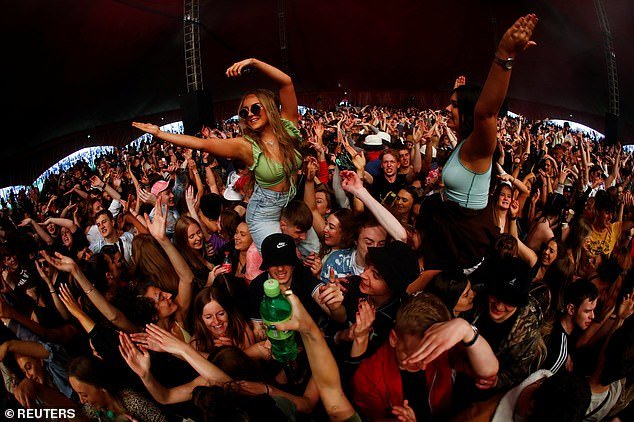Big events of 50 people or more could be more Covid safe than modest parties of 10 to 20 people, according to SAGE scientists.
People don’t actually mix with a lot of people at large gatherings and only rarely go to them so experts say they may not pose much risk of transmission.
But smaller events happen more often and people have more close contact with the other people there, they said.
The evidence could bode well for concerts, sporting events and theatres reopening in the summer. They are expected to be able to start up again from May 17, in just 10 days’ time.
The research was presented to government advisers by SAGE members from the universities of Bristol, Warwick, Manchester, Lancaster and the London School of Hygiene & Tropical Medicine.
It said: ‘Large groups of individuals have a relatively small impact on an epidemic, under normal circumstances with pre-Covid contact patterns.’
The UK has started trials of reopening large events, starting with a club night in Liverpool where people did not have to wear face coverings or social distance for the first time since before lockdown

Music fans in Sefton Park Liverpool, attended a concert by bands including Blossoms as part of live event trials
The paper explains that, in normal life, large events of more than 50 people only account for 0.5 per cent of people’s interactions with others.
Even though there are more people around them, opportunities to catch the virus – by being close to someone or touching them – are fewer because people tend not to mix with most people at huge events, instead sticking in small numbers.
It said: ‘If a person attended a concert with 1,000 people, but only spoke to five people, the number of recorded group contacts would be five.’
It suggests that around 5.4 per cent of Covid cases could be linked to gatherings of 50+ people in non-lockdown times.
This compared to 18.9 per cent of infections being caught in situations with between 20 and 49 people, and 25.2 per cent transmitting in groups of 10-19.
It did not study smaller groups – the current legal limit is six people for socialising, 15 for weddings or child-parent groups and 30 for funerals.
The team’s modelling found that people’s close contact time increased in line with the number of people they saw up to about 20 people, when it peaked at 29.5 hours of combined contact time in a day.
And although groups of 30, 40 or 50 people could have similar levels of contact time, they were less common.
Smaller groups, meanwhile, brought a lot of contact time and were also very common, with gatherings of seven to 20 people making up 60 per cent of all groups.

Snooker fans at Sheffield’s Crucible Theatre were required to wear masks but did not need to socially distance as part of another test event
The paper said: ‘Without social distancing and assuming normal behaviour, large groups of individuals have a relatively small epidemiological impact.
‘Small and medium sized groups between 10 and 50 people have a larger impact on any epidemic.’
The study did not distinguish between indoor and outdoor gatherings and it added: ‘The pattern of decreasing [cases] with increasing group size is seen for both groups of individuals who are known to each other and groups of individuals who are unknown to each other.’
The research was published by the government as part of the weekly release of SAGE documents.
It comes a week after the UK started trials of large events with a nightclub reopening and a gig in Liverpool, and allowing snooker spectators in Sheffield.
Thousands of music fans flooded Liverpool’s Sefton Park on Sunday night to attend the UK’s first post-lockdown gig headlined by indie band Blossoms.
In total 5,000 fans were allowed into the gig and they were not required to wear masks or socially distance during the event.
The line-up included Blossoms, The Lathums and Liverpool singer-songwriter Zuzu and the event formed part of the national Events Research Programme (ERP).
Ticketholders had to take a Lateral Flow Test at a community testing site 24 hours before the event and had to produce a negative result to gain entry.
Attendees then havd to take another test five days after the event as part of the ERP’s research.
Meanwhile in Sheffield, fans continued to be allowed to watch the World Championship Snooker final. They had to wear masks but didn’t need to socially distance.
